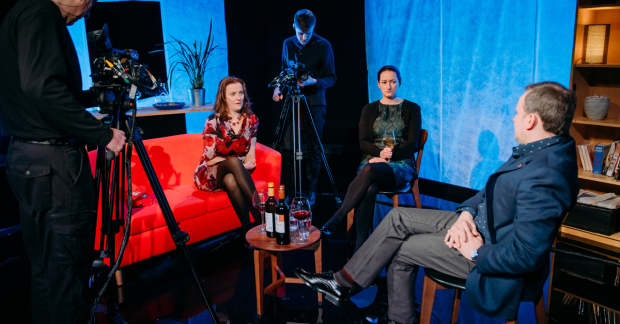The Destroyed Room (Battersea Arts Centre)

© Mihaela Bodlovic
All talk, no action – it's an old recipe for bad theatre, but Matthew Lenton, artistic director of Glasgow's Vanishing Point, turns it into something else in The Destroyed Room: a damning indictment of inaction in a world on the brink of catastrophe.
This is no mere ticking off, though, but rather a piece that understands and encapsulates the overwhelming impossibility of doing anything else, the feeling of utter futility in the face of insurmountable issues.
Inspired by Jeff Wall's photograph of the same name, a shot of a room in total disarray, turned upside down by someone or something long since gone, The Destroyed Room suggests the world is in a similar state.
Lenton stages a conversation between three actors, one that purports to be genuine, in-the-moment and off-the-cuff. Prompted by the question, 'Are people happier now than ever before,' Elicia Daly, Pauline Goldsmith and Barnaby Power sit around a coffee table and start talking – about happiness, about terrorism, about cats, about refugees, about themselves.
Just as Wall's photograph nods to its own artifice – it is, in essence, a stage set – so too does Lenton's conversation. It asks us to doubt its authenticity; to notice that, for all its overlaps and inarticulacy, it is, in fact, a scripted simulacra of a real conversation. The set has the cheap homeliness of a television chat show: pot plants, bookshelves, screwcap wine at the ready. That's fake too, thin as Ribena.
It's a stressful watch, queasily artificial and slippery as soap. Conversations happen at cross-purposes. They tie themselves in knots, tangling up with tangents, anecdotes and hazy, half-remembered Guardian opinion pieces. Following the thread is enough to furrow your brow, even without the distraction of a live feed onscreen overhead. Your concentration constantly snags – on earings, on accents, on close-ups, on cameramen. It's overwhelming. Abrasive. Infuriating.
What does all this talk achieve? Not a lot. How could it? No-one's in control of what they're saying, let alone the course of a conversation that's interrupted by nitpicky objections, dragged off point, fuzzied by wine and ego and insistent self-righteousness.
As it careers, the conversation starts to reflect the modern media landscape – one in which Syrian refugees sit next to piano-playing cats, and French flags fly over holiday snaps. Online, the personal slams into the political, so that your sister's engagement shares a space with executions in Raqqa. News confuses itself with entertainment. Comedians write comment pieces, and natural disasters make compulsive viewing. Everything is equally unreal. Underfoot, water creeps silently across the stage.
The Destroyed Room is an aneurysm of a show, a leap into the eye of the shitstorm. Lenton pins down the complicity, complexity and contradictions of modern, mediatised life, in which awareness is inescapable, ignorance is wilful and inaction is – or at least feels – inexcusable.
Is it part of the problem it describes? Quite possibly. It turns reality into entertainment, and, by offering no solutions, however small, Lenton lets us luxuriate in liberal guilt. It could stress its self-awareness better, but, ultimately, it delivers a sharp shock that cuts through the rest – one that presses home the reality of the refugee crisis and sends you out shaken, in search of something you can do. Or someone to talk to. Or, maybe, just a glass of wine.
The Destroyed Room runs at the Battersea Arts Centre until 14 May.










